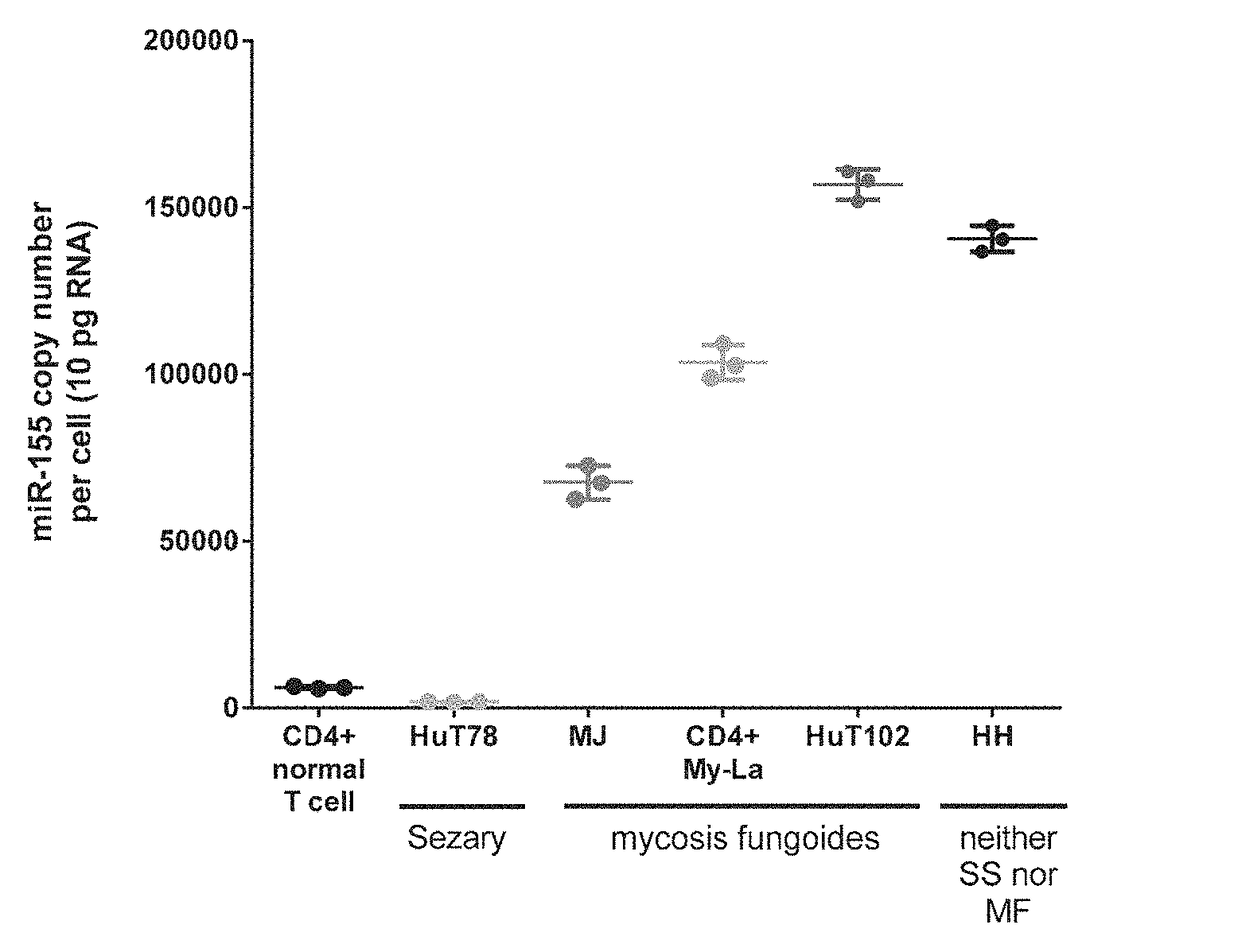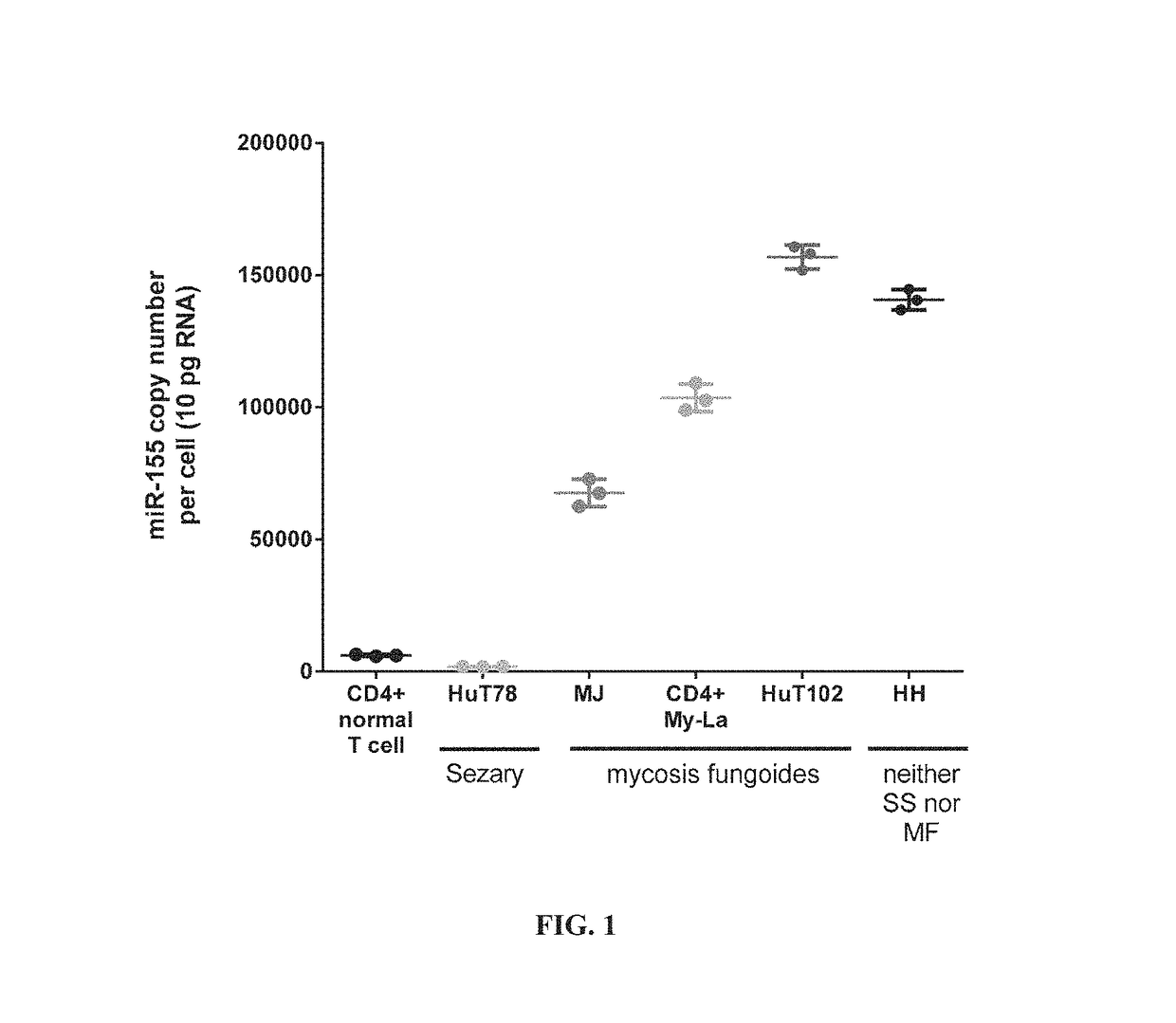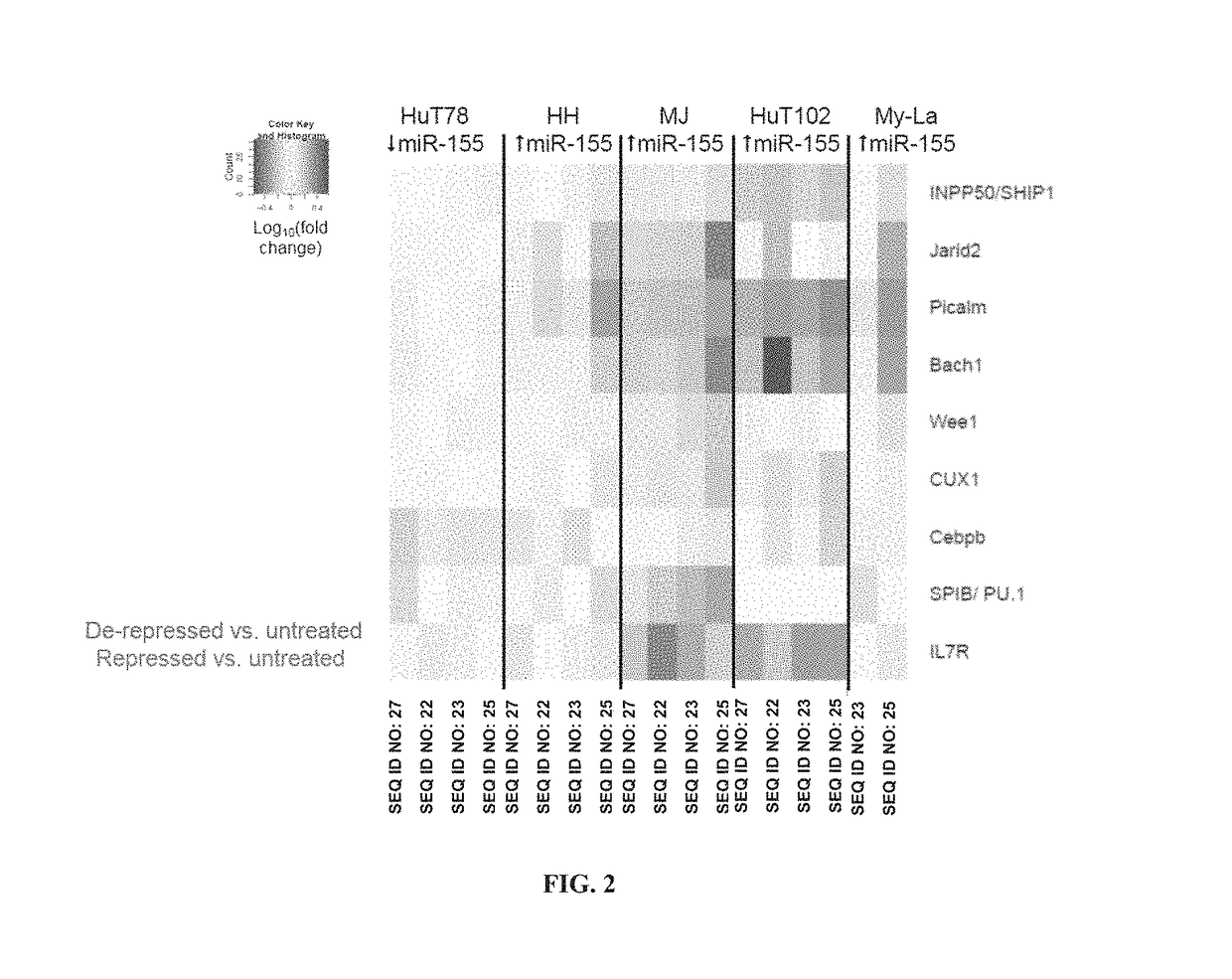miR-155 inhibitors for treating cutaneous T cell lymphoma (CTCL)
a technology of mir155 and inhibitors, which is applied in the field of oligonucleotide inhibitors of mir155, can solve the problems of partial disease regression, full eradication, and no therapies that cure or prolong the survival of late-stage ctcl, and achieve the effects of reducing the proliferation of cancer cells, and reducing the activity or function of mir155
- Summary
- Abstract
- Description
- Claims
- Application Information
AI Technical Summary
Benefits of technology
Problems solved by technology
Method used
Image
Examples
example 1
Oligonucleotide Inhibitors of miR-155 (“antimiR-155”) are Active in Mycosis Fungoides Cell Lines which Show Increased miR-155 Expression
[0157]To characterize miR-155-5p expression in cell lines derived from CTCL patients, the absolute levels of miR-155-5p in mycosis fungoides (MF), Sézary syndrome (SS), and a CTCL cell line classified as neither MF nor SS were measured. The cellular, pathological, and molecular characteristics of the cell lines examined are shown in Table 3.
[0158]
TABLE 3Characteristics of CTCL Cell LinesTissueExpressedMolecularNameDiseaseAgesourceAntigensCharacteristicsHuT78Sézary53PeripheralCD4+HTLV−syndromebloodMJMycosis50PeripheralCD4+,HTLV+fungoidesbloodCD3+,CD2+My-LaMycosis82SkinCD4+,HTLV−fungoidesplaqueCD3+,CD2+HuT102Mycosis26LymphCD4+HTLV+fungoidesnodeHHNeither61PeripheralCD4+,HTLV−mycosisbloodCD3+,fungoides norCD2+,SézaryCD30+syndrome
[0159]The absolute expression of miR-155-5p in the CTCL cell lines compared to normal peripheral CD4+ helper T-cells was measu...
example 2
AntimiR-155 Compounds 2 (SEQ ID NO: 22) and 4 (SEQ ID NO: 25) Show Greater Activity in Mycosis Fungoides Cells Lines Compared to Other antimiR Compounds
[0161]Four direct gene targets of miR-155-5p (Bach1, Jarid2, Picalm, and Ship1) were chosen for additional analysis, as these four genes were modulated by antimiR-155 in all three mycosis fungoides cell lines (MJ, HuT102, and My-La). These genes were chosen to represent the gene expression signature for antimiR activity in vitro. Additionally, the four-gene signature was used to compare the activity of the antimiR compounds. These gene changes were reproducible over three independent experiments with cells of varying passage numbers. FIGS. 3, 4, 5, 6, and 7 show the fold-change results of this four-gene signature in the HuT102, MJ, HH, My-La, and Hut78 cell lines, respectively. * p-value <0.0001 vs untreated by nonparametric Mann-Whitney test. The Mann-Whitney test was chosen because the variances are unequal between the treatments c...
example 3
Gene Expression Changes Induced by antimiR-155 Treatment are Specific to the Inhibition of miR-155
[0163]To test the specificity of the gene expression changes induced by antimiR-155 compounds of the invention, mycosis fungoides cell lines were treated with oligos that do not target miR-155 (control oligos). The control oligonucleotide was a 14-nucleotide antimiR targeting a C. elegans miRNA not expressed in mammals (control 1). The second oligo is a scramble of the 14-nucleotide sequence of antimiR-155 compound 4 (control 2). The MJ and HuT102 cell lines were incubated with 10 μM antimiR-155 compounds 3 (SEQ ID NO: 23) or 4 (SEQ ID NO: 25) or the two control oligos for 72 hours. FIG. 8 shows the fold-change in gene expression for the four direct targets of miR-155-5p as measured by PCR. The gene expression signature in cells treated with antimiR-155 compounds 3 (SEQ ID NO: 23) or 4 (SEQ ID NO: 25) was statistically significantly different from that of untreated cells. In contrast, g...
PUM
 Login to View More
Login to View More Abstract
Description
Claims
Application Information
 Login to View More
Login to View More - R&D
- Intellectual Property
- Life Sciences
- Materials
- Tech Scout
- Unparalleled Data Quality
- Higher Quality Content
- 60% Fewer Hallucinations
Browse by: Latest US Patents, China's latest patents, Technical Efficacy Thesaurus, Application Domain, Technology Topic, Popular Technical Reports.
© 2025 PatSnap. All rights reserved.Legal|Privacy policy|Modern Slavery Act Transparency Statement|Sitemap|About US| Contact US: help@patsnap.com



